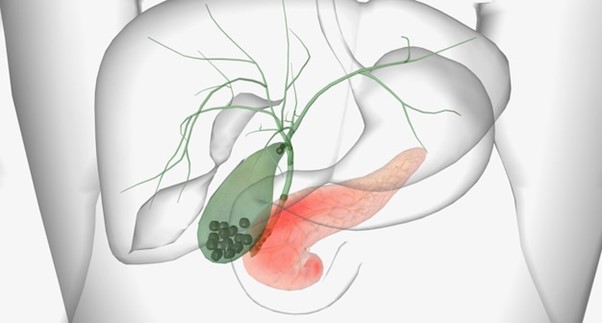- Home
- Cholecystitis

What is Cholecystitis?
Cholecystitis is the inflammation of the gallbladder, a small organ located beneath the liver that stores bile, a digestive fluid produced by the liver. This condition can cause severe abdominal pain and other complications if not treated promptly.
Symptoms of Cholecystitis
The primary symptom of cholecystitis is intense pain in the upper right or center of the abdomen. This pain can radiate to the right shoulder or back and often worsens after eating fatty foods. Other symptoms include:
- Nausea and vomiting
- Fever and chills
- Tenderness over the abdomen
- Bloating
- Jaundice (yellowing of the skin and eyes) in severe cases
Causes of Cholecystitis
Cholecystitis is most commonly caused by gallstones, which block the cystic duct and trap bile in the gallbladder, leading to inflammation. Other potential causes include:
- Tumors: Can block bile drainage
- Bile duct blockage: Due to scarring or other conditions
- Infections: Certain bacterial infections can cause inflammation
- Blood vessel problems: Decreased blood flow to the gallbladder
Diagnosis and Treatment
Diagnosing cholecystitis involves a combination of physical examinations, blood tests, and imaging studies such as an ultrasound, CT scan, or HIDA scan to visualize the gallbladder.
- Treatment Options:
- Medications: Antibiotics to treat infection and pain relievers to manage pain.
- Fasting: Temporarily stopping food and drink intake to rest the gallbladder.
- Surgery: The primary treatment for cholecystitis is cholecystectomy, the surgical removal of the gallbladder. This can be performed using:
- Laparoscopic cholecystectomy: A minimally invasive procedure with small incisions.
- Open cholecystectomy: A more extensive surgery involving a larger incision, usually performed if the gallbladder is severely inflamed or infected.
Importance of Prompt Treatment
Untreated cholecystitis can lead to severe complications, such as a ruptured gallbladder, peritonitis (inflammation of the abdominal lining), or sepsis (a life-threatening infection). Prompt medical intervention is crucial to prevent these complications and ensure a full recovery.
Cholecystitis is a serious condition that requires timely diagnosis and treatment. Understanding its symptoms and causes can help in seeking appropriate medical care and avoiding potential complications.

